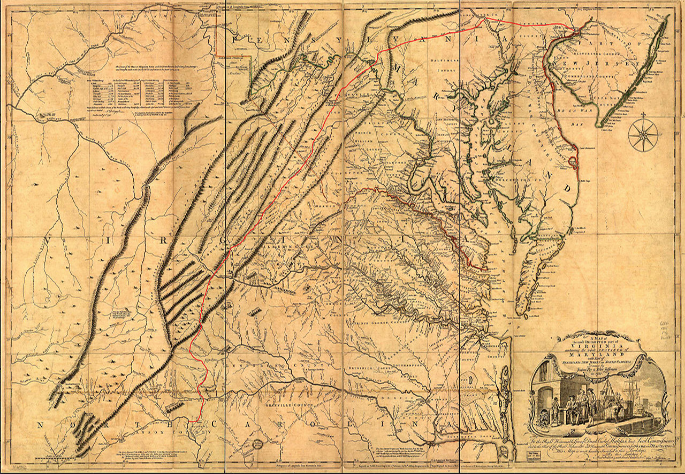Notes on the State of Virginia: Journey to the Center of an American Document, Queries X, XI, XII, and XIII

This is the sixth installment of a year-long journey through Thomas Jefferson’s Notes on the State of Virginia.
**
Query X: The marine
Query XI: A description of the Indians established in that State
Query XII: A notice of the counties, cities, townships and villages
Query XIII: The constitution of the State, and its several charters
In these queries, Jefferson continues enumerating the features of Virginian civilization: its marine vessels (X), the activities of Native American tribes (XI), the locations of urban centers (XII), and the nature of civic power in the Commonwealth (XIII). While Jefferson discusses a range of topics here, these sections of Notes share a general rhetorical structure that emphasizes historicity as the basis for making claims about the Commonwealth’s future. You might summarize it like this:
“Before, there was X and this is where X is today.”
In that light, we can see how the dual projects of tabulation and cataloguing (established in prior sections of Notes) serve a purpose for Jefferson here. Each fact that he presents—the name of a tribe, a legal charter, a village—has an origin leading either to the future or to obsolescence. By arranging items along a timeline, Jefferson creates a seemingly causal, data-driven platform from which he can make conjectures about what may happen next. Of course, Jefferson has an agenda. He wants to show that Virginia is well on its way towards his vision of enlightened republicanism.
In Query XI, for example, Jefferson maps Native American tribes across geographical and chronological lines, painstakingly describing where certain tribes originated and where they now reside. Jefferson is fascinated with Native American “vocabularies,” which, he hypothesizes, must derive from a common root (what Jefferson calls a “radical” language) brought to North America from an ancient Asiatic ur-“stock.” He laments that present-day tribal groups have lapsed from this supposedly unified ideal, breaking into smaller societies with separate dialects and “undefined” geographical territories and moral systems:
It will be said that great societies cannot exist without government. The savages, therefore, break them into small ones.
In Notes, we see that Jefferson believes a “great society” progresses towards what he views as increased precision of language, preferably enshrined in a written code of laws. His prediction, in Query XI, that Native American civilizations will not attain “greatness” is based, in part, on his opinion that their multiplicity of dialects takes them too far from their common ancient language source, and therefore unlikely to draw together under a singular system of government. In this sense, Query XIII is the mirror-image of Query XI, as it traces a more optimistic trajectory for the Commonwealth when it comes to the continual advancement of its laws. In detailing each draft of Virginia’s state constitution and linking them back to English colonial charters (the main work of Query XIII), Jefferson presents an image of the Commonwealth gradually maturing in its balance of executive, legislative, and judicial authority. By contrast, the Native American tribes, “having never submitted themselves to any laws,” are, in his view, diminishing in stature.
It goes beyond saying that Jefferson displays some painfully insensitive attitudes about Native Americans in Notes. He openly admires tribal members’ oratory and their artistic craftsmanship, but predicts that without Virginian-style laws and agricultural practices, these societies are destined eventually to disappear. He continually depicts tribal production as ephemeral, inferior to the long-lasting achievements the Virginians are supposedly building:
I know of no such thing existing as an Indian monument; for I would not honor with that name arrow points, stone hatchets, stone pipes, and half-shapen images.
Jefferson’s assessment of local Native American cultures glosses over the facts. War, disease, and Anglo-American encroachment, not lack of “government” (tribal law is a topic he does not seem to investigate at all in Notes), are to blame in the displacement of Native American groups. While Jefferson seems to express real regret that certain tribal populations and languages are disappearing, he focuses not on the moral consequences of this ongoing tragedy, but on the potential losses to the sum of human knowledge:
We have suffered so many of the Indian tribes already to extinguish, without our having previously collected and deposited in the records of literature, the general rudiments at least of the languages they spoke.
Jefferson’s transactional language stings here, his obsessive talk of “collections” and “deposits.” His focus on intellectual inquiry blinds Jefferson to the transgressions he commits, first by judging Native American societies by the standards of his own, and, more concretely, by opening a burial mound on his property as part of an archaeological exercise. The excavation, detailed in Query XI, is meant “to satisfy” local debate about the contents and organization of the mound. By identifying the distinct “strata,” or layers, of artifacts within, Jefferson presents the mound as a timeline that preserves a distinct, ancient past. But not everything fits neatly into the layers he delineates. Jefferson is baffled by how the bones are arranged in the mound, remarking:
[T]hese were lying in the utmost confusion, some vertical, some oblique, some horizontal, and directed to every point of the compass, entangled and held together in clusters by the earth.
When Jefferson tries to “read” the burial mound like a ledger or a legal document, his vision fails to encompass everything. It reminds me that so many of the elements that make up his world—human elements—resist his externally imposed categories. As I move through Notes, I feel the tension in Jefferson’s contradictory rhetoric, the way it always imposes its orderly grids at a cost. Jefferson’s dig was the first systematic archeological investigation in the United States, but it also ruined a spiritual site that, Jefferson tells us, had been visited by local tribal members on a regular basis. Jefferson compiled and preserved as much evidence as he could of tribal languages, but as President, he designed and enacted policies meant to coerce Native Americans into giving up their lands by crippling them with debt. As a writer, I end up questioning Jefferson’s standards for pretty much everything he values most in language: efficiency, balance, even clarity. To read Notes in 2016, Jefferson’s ideas must be “held together in clusters” in your mind.
Forget about straight lines for now.



